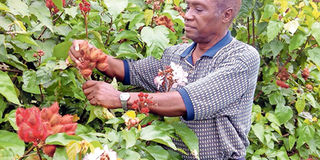Future looking colourful for bixa

Julius Kilongosi, a former accountant at Bamburi Cement, who now grows bixa in his farm in Kwale. The bixa shrub, according to him, is less labour intensive and is disease-and-pest free and drought-resistant. PHOTO | FADHILI FREDRICK | NMG
What you need to know:
- Bixa is known at the Coast as ‘mrangi’ because of its bright red fruits, which contain numerous seeds. As they ripen, the fruits dry and harden into brown capsules.
- There are at least 500 bixa farmers in Kwale and 25,000 across the Coast, according to Kenya Bixa Ltd, a company that buys and processes Bixa for export.
- Kilongosi believes that with proper policies and appropriate technology, bixa products have the potential to transform farmers’ lives.
- An acre can accommodate roughly 300 trees, and each can produce at least 10-16kg of bixa in a year.
The prospects of farmers growing bixa at the Coast are looking brighter following the government’s announcement that the crop is among those for which it has secured market in China.
Farmers are, therefore, expected to start selling bixa seeds in the Asian nation as soon as the government finalises its deal with the country.
“We signed agreements that allow us to export various agricultural produce like avocado, French beans, pulses (beans, peas and green grams), vegetables and fruits, flowers, herbs, peanuts, meat, hides and skins, macadamia and gum Arabic,” said Nzioka Waita, the Chief of Staff at State House.
In Kwale County, bixa farmers are optimistic. Initially, they would sell their produce to brokers at throwaway prices. However, lately they have been selling to a company in the area.
Bixa is known at the Coast as ‘mrangi’ because of its bright red fruits, which contain numerous seeds. As they ripen, the fruits dry and harden into brown capsules.
The fruit is harvested for its seeds, which contain bixin, used for colouring cheese, fish, salad oil, margarine and cosmetics like lipsticks. Extracts from the seeds can also be used to kill mosquito larvae, research shows.
The crop was introduced at the Coast in 1970s but has not been doing well for lack of quality market. A kilo of bixa seeds is currently going for Sh70.
There are at least 500 bixa farmers in Kwale and 25,000 across the Coast, according to Kenya Bixa Ltd, a company that buys and processes Bixa for export.
Julius Kilongosi, a former accountant at Bamburi Cement, is among those who grow bixa. He farms the crop on his two acres in Masimbani village in Lunga Lunga.
Other areas where bixa is grown are Mswambweni, Lamu, Malindi and Kiunga, near the Somalia border.
CUTTING MATURE PODS
The bixa shrub, according to him, is less labour intensive and is disease-and-pest free and drought-resistant. Animals do not feed on it and needs little fertiliser for growth.
He started growing bixa last year and he has already sold more than 100kg.
"I bought 200 bixa seedlings for Sh2,000. I started harvesting in September and I expect to earn at least Sh210,000 by the end of the season. It is a good crop and my hopes on it have risen," he says.
Kilongosi believes that with proper policies and appropriate technology, bixa products have the potential to transform farmers’ lives.
Michael Mutinda, a contracted bixa farmer in Shimba Hills, says the new market will improve the prices of bixa.
“It provides an alternative market for our products and I hope to earn more,” he says.
Stephen Gambo, the agribusiness manager at Kenya Bixa Ltd, says there are two bixa farming seasons at the Coast, January to April and August to December.
An acre can accommodate roughly 300 trees, and each can produce at least 10-16kg of bixa in a year.
Harvesting is done by cutting mature pods from the tree, which are then dried and eventually threshed to produce the seeds that are cleaned, dried and packed in gunny bags for collection.
"The company provides interested farmers with seeds and agronomical advice for quality production," he says, adding that they are buying and processing bixa seeds to produce norbixin for export.
Msambweni sub-county agricultural officer Nicholas Mwambezi encourages farmers to venture into bixa farming because it has a ready market.
“It is one of the cash crops that does well in the county and it has the potential to improve the lives of the people because of its high economic value,” he says.





